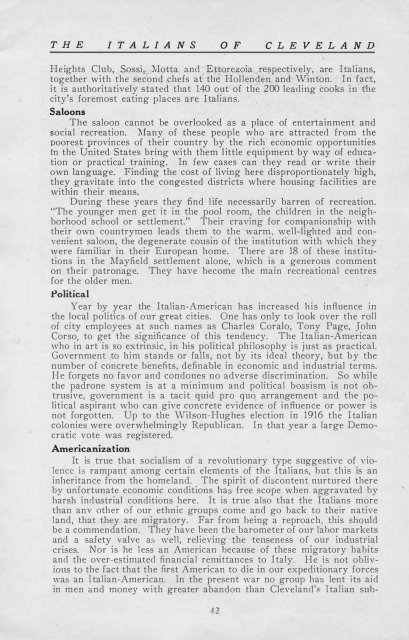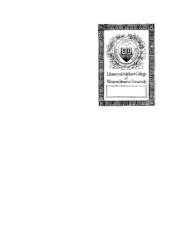The Italians of Cleveland
The Italians of Cleveland
The Italians of Cleveland
You also want an ePaper? Increase the reach of your titles
YUMPU automatically turns print PDFs into web optimized ePapers that Google loves.
THE ITALIANS O F CLEVELAND<br />
Heights Club, Sossi Motta and Ettorezoia re.spect.ively, are <strong>Italians</strong>,<br />
together with the second chefs at the Hollenden. ilnd Winton. In fact,<br />
it is authoritatively stated that 140 out <strong>of</strong> the 200 leading cooks in the<br />
city's foremost eating places are <strong>Italians</strong>.<br />
Saloons<br />
<strong>The</strong> saloon cannot be overlooked as a place <strong>of</strong> entertainment and<br />
social recreation. Many <strong>of</strong> these people who are attracted from the<br />
poorest provinces <strong>of</strong> their country by the rich economic opportunities<br />
In the United States bring with them little equipment by way <strong>of</strong> education<br />
or practical training. In few cases can they read or write their<br />
own language. Finding the cost <strong>of</strong> living here disproportionately high,<br />
they gravitate into the congested districts where housing facilities are<br />
within their means.<br />
During these years they find life necessarily barren <strong>of</strong> recreation.<br />
"<strong>The</strong> younger men get it in the pool room, the children in the neighborhood<br />
school or settlement." <strong>The</strong>ir craving for companionship with<br />
their own countrymen leads them to the warm, well-lighted and convenient<br />
saloon, the degenerate cousin <strong>of</strong> the ins.titution with which they<br />
were familiar in their European home. <strong>The</strong>re are 18 <strong>of</strong> these institutions<br />
in the Mayfield settlement alone, which is a generous comment<br />
on their patronage. <strong>The</strong>y have become the main recreational centres<br />
for the older men.<br />
Political<br />
Year by year the Italian-American has increased his influence in<br />
the local politics <strong>of</strong> our great cities. One has only to look over the roll<br />
<strong>of</strong> city employees at such names as Charles Coralo, Tony Page, John<br />
Corso, to get the significance <strong>of</strong> this tendency. <strong>The</strong> Italian-American<br />
who in art is so extrinsic, in his political philosophy i just as practical.<br />
Government itO him stands or falls, not by its ideal theory, but by the<br />
number <strong>of</strong> concrete benefits, definable in economic and industrial terms.<br />
He forgets no favor and condones no adverse discrimination. So while<br />
the padrone system is at a minimum and political bo sism is not obtrusive,<br />
government is a tacit quid pro quo arrangement and the political<br />
aspirant who can give concrete evidence <strong>of</strong> influence or power is<br />
not forgotten. Up to the Wilson-Hughes election in 1916 the Italian<br />
colonies were overwhelmingly Republican. In that year a large Democratic<br />
vote was registered.<br />
Americaniza tion<br />
It is true that socialism <strong>of</strong> a revolutionary type suggestive <strong>of</strong> violence<br />
i rampant among certain elements <strong>of</strong> the <strong>Italians</strong>, but this is an<br />
inheritance from the homeland. <strong>The</strong> spirit <strong>of</strong> di content nurtured there<br />
by unfortunate economic conditions ha free scope when aggravated by<br />
harsh inc1 ustrial conditions here. It is true also that the <strong>Italians</strong> more<br />
than anv other <strong>of</strong> our ethnic groups come and go back to their native<br />
land, that they are migratory. Far from being a reproach, this should<br />
be a commendation. <strong>The</strong>y have been the barometer <strong>of</strong> our labor markets<br />
and a safety valve a well, relieving the tenseness <strong>of</strong> our industrial<br />
crises. Nor is he less an American because <strong>of</strong> these migratory habits<br />
and the over-estimated financial remittances to Italy. He is not oblivious<br />
to the fact that the first American to die in our expeditionary forces<br />
wa an Italian-American. In the present war no group ha lent its aid<br />
in men and money with greater abandon than <strong>Cleveland</strong>'s Italian sub-<br />
42

















